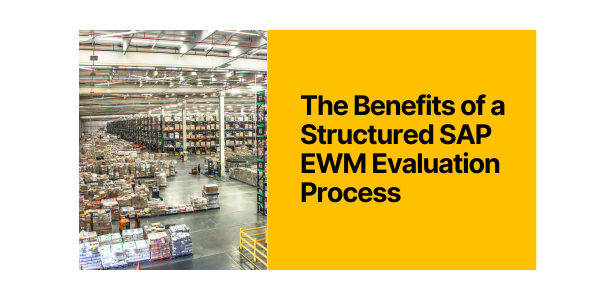The Benefits of a Structured SAP EWM Evaluation Process
Lewis Marston
August 13,2018


Many companies running either SAP Warehouse Management (WM) or third party warehouse management systems are starting the process of replacing these and want to quickly evaluate the viability and potential benefits of SAP Extended Warehouse Management (EWM).
Regardless of the drivers and goals behind this, whether it be the replacement of SAP WM as part of an S/4HANA strategy, avoiding third party WMS upgrade and interface costs, supporting business expansion or driving down operating costs, it will necessitate an analysis of all costs, benefits, risks, resources requirements and timelines. Doing this in a structure way will help demonstrate how strategic, IT and operational objectives can be met and expectations of organisational benefits managed across key stakeholders from the outset.
It is also important to recognise that during any evaluation process, whilst some of the organisational benefits of EWM come from an IT perspective, for example simplification of the IT landscape as part of a wider IT strategy, many of the other benefits of SAP EWM are derived from operational and business performance improvements. Often, evaluation is carried out on detailed features and functions only, which fails to identify and quantify actual incremental value to the business.
IT are often tasked with this, however, business cases completed in isolation often risk failure to identify incremental benefit. You may also risk only recognising what is painful to the business today. Therefore to identify what is important in the future, cost and risk alone will not provide a robust business case that includes, not only replacing current systems and meeting IT objectives, but identifies incremental benefit through business improvement.
Download our comprehensive guide to Mobilising your SAP Supply Chain Workforce
This approach increases the success and speed of budget sign off. It also helps wider stakeholder involvement outside the IT department, effectively building early involvement and awareness of potential benefits to the organisation and fostering better stakeholder buy-in. Stalled projects occur when there is a disconnect between the project cost and the value generation to the business.
A warehouse evaluation process will form a critical part of any business plan, informing the business whether or not the platform meets the specific wider needs of the business and helping stakeholders to understand how they can demonstrate this to the board.
The key deciding factors are:
IT managers needs to be confident that they have made an informed decision to present information correctly to the board and be confident in securing funds whilst recommending a solution that will demonstrate an ROI. Performing and following a structured, best practice evaluation that is carried out against business, IT and operational (warehouse and supply chain) requirements, will help to support a successful warehouse management platform selection due diligence process and provide valuable input to the corresponding business case.
Full Partner Life Cycle
Migrating from WM to EWM, or moving to SAP EWM, offers multiple opportunities to extrapolate value through improved operational processes. Furthermore, working with a partner early on to produce an evaluation that clearly defines strategic requirements against platform capabilities in the business case will help drive operational efficiencies and increase incremental ROI.
Structuring a business case for a new warehouse management system is difficult, but a partner with a strong operational understanding will help to support alignment and engagement between IT, supply chain and finance leaders in this critical step.
Getting the most from your supply chain and SAP Extended Warehouse Management platform takes a unique understanding of the extensive nature of modern supply chains and the diversity of technologies that support them.
If you are running SAP Warehouse Management (WM) or, are in the process of understanding any potential fit of SAP Extended Warehouse Management (EWM) get in touch with one of our experts today to learn more.
SAP’s Extended Warehouse Management (EWM) solution is steadily becoming one of the market’s leading warehouse management systems. If you are faced with the need to migrate to new supply chain platforms from either Warehouse Management and/or Transportation in SAP ECC read more.
Warehouse Management System Evaluation and Selection
If you wish to support your warehouse management platform selection process, provide input into your business case and gain access to our SAP Platform 4D Evaluation tool kit, we work against key phases from preparation, discovery, evaluation to playback. With each phase populating the WMS Evaluation Report. If you would like to learn more please arrange a time to speak with one of our experts. Get in touch